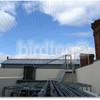These pages offer information on the biological control of flies on poultry farms and we can also provide information on request for other livestock enterprises. Flies are a huge problem on poultry units over the summer - but by acting early producers stand the greatest chance of successfully controlling them.
Summer is on its way, with it the inevitable seasonal pest: Flies. Always a challenge for poultry producers to control, flies can carry disease and irritate the chickens, so it's essential to act early to prevent the population getting out of hand. Chemical controls can be expensive, environmentally unfriendly and of course are prohibited on organic units.
But there is another, effective option: Parasitic wasps. An increasing number of free-range poultry producers are using these little creatures to tackle flies in their poultry units. Wasps are the size of an ant or gnat and do not fly around in the environment, but stay in the manure pit where their food source and breeding ground are.
Summer is on its way, with it the inevitable seasonal pest: Flies. Always a challenge for poultry producers to control, flies can carry disease and irritate the chickens, so it's essential to act early to prevent the population getting out of hand. Chemical controls can be expensive, environmentally unfriendly and of course are prohibited on organic units.
But there is another, effective option: Parasitic wasps. An increasing number of free-range poultry producers are using these little creatures to tackle flies in their poultry units. Wasps are the size of an ant or gnat and do not fly around in the environment, but stay in the manure pit where their food source and breeding ground are.
Services
Introduction
Report
If you are interested in using natural control methods, have worries regarding potential fly nuisance reports or plan to reduce your chemical control methods, this is the place to explore the possibilities. Biological control methods are effective and economical to use. They work by breaking the fly lifecycle before the new fly emerges from the pupa.
Fly Life cycle
Report
The speed at which flies reproduce is not fixed and therefore varies tremendously depending on the suitability of the environmental conditions at that point in time. They are capable of reproducing in 8-12 days during warmer weather. Flies need warmth and moisture with a food source; the laying house gives them all these things conducive to rapid reproduction and population increases.
Parasitic Wasps
Report
Parasitic wasps are not harmful to humans or animals; they do not sting and do not fly around in the environment. Their sole focus is to breed and complete their own life-cycle; to do this they need flies, as they lay their eggs within the fly pupa, thus destroying the fly's lifecycle, taking the title predator wasp.
Ordering
Report
Parasitic wasps are ordered directly from us. Make an initial enquiry and one of the team will get back to you to answer your questions and discuss your specific requirements. We supply wasps to customers all over the UK and send them out fresh when you need them. Once you are set up for the season the wasps will arrive automatically close to the time you need to use them.
Free Range/Litter Houses
Report
Free range layer production lends itself well to biological fly control. We have been providing biological fly control for a number of years into this system therefore can offer site specific advice. As a guide, for every 3000 layers you will need a minimum of 1 pack of wasps per application; if you have 12000 layers you will need a minimum 4 packs per application.
Reviews

Be the first to review Biological & Chemical Fly Control.
Write a Review


